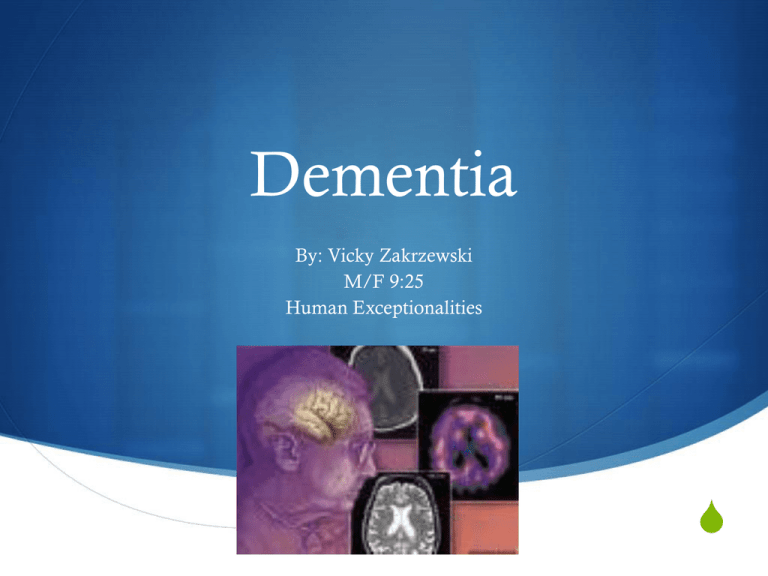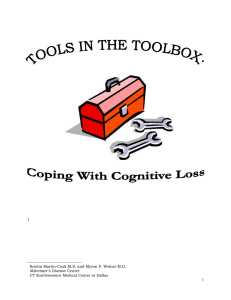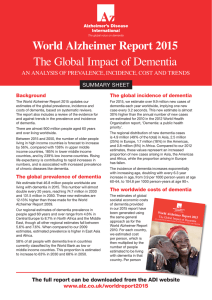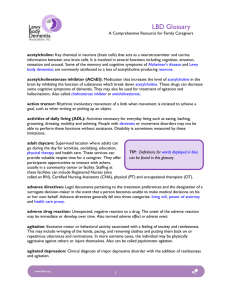Dementia
advertisement

Dementia By: Vicky Zakrzewski M/F 9:25 Human Exceptionalities S Statistics S In 2008, there are currently 29.8 million people with dementia, with the number expected to be 81.1 million by 2050. S It is estimated there will be 4.6 million new cases of dementia every year (one new case every 7 seconds). The number of people affected will double every 20 years to 81.1 million by 2040. What is Dementia S Loss of mental skills that effect your daily life S Causes problems with your memory and how well you think and plan S Most common forms are Alzheimer’s disease and multi-infarct dementia S Coined from the Latin words de – meaning apart or away and mens meaning mind Causes S Strokes, tumors, head injuries S Diseases such as Parkinson’s S Underactive thyroid gland S Not enough B12 S Fluid buildup in the brain Symptoms S Memory loss is the biggest factor and warning sign S Getting lost in places you are familiar with S For get people they know and their names S Can’t control their moods often are depressed S Trouble balancing a check book or calculating things S Trouble bathing and grooming themselves S Repeating the same question over again S Loss of coordination and basic motor function Diagnosed S Doctor gives you a physical exam S Mini mental state examination (MMSE) S Abbreviated mental test score (AMTS) S Series of blood tests S MRI and CT scans S Addenbrooke's Cognitive Examination to distinguish it from Alzheimer's disease Types S Most Common: Alzheimer’s disease, Binswanger’s disease, Pick’s disease S Less Common: Creutzfelt-Jakob disease, Huntington’s disease, Parkinson’s disease Effected Brain Treatment S Less than 10% of dementia cases are reversible S Take vitamins such as B12 S Take medicine to treat depression S When it can not be reversed the doctor will prescribe these medications to make it easier for the patient: S Aricept® (donepezil S Cognex® (tacrine) Challenges Caregivers Face S If the loved one is able to continue driving S Financial and Legal planning such as what they wish to do with their medical plan, and will S Whether it’s time their loved one should be placed in a nursing home Care Givers Need Breaks S Local Resources S Respite Care -Publicly or Privately paid temporary care (relieves primary care giver to do errands or just "get away for a while"). -Friends and relatives often provide this even when they are unable or unwilling to share primary care responsibilities S .Adult Day Care -Private programs that provide a safe, structured setting that helps maintain functioning in the affected relative (also respite for the care giver) S Adult Foster Care -Private individuals or non-profit organizations maintain houses and provide care for one or more impaired persons (person must generally be able to perform most self-care functions). S Meals on WheelsCase Manager and Service Coordinator -In recent years a number of people, often social workers, assist the families of cognitively and/or physically impaired persons with identifying and coordinating needed services Video S http://video.search.yahoo.com/video/play?p=dementia&ei =UTF-8&fr=yfp-t-701&tnr=21&vid=0001806360170 Work Cited S http://psychcentral.com/lib/2006/what-is-dementia/ S http://familydoctor.org/online/famdocen/home/seniors/ mental-health/662.html S http://www.pharmacy-and- drugs.com/Neurological_disorder/Dementia.html S http://www.ncpamd.com/dementia.htm











